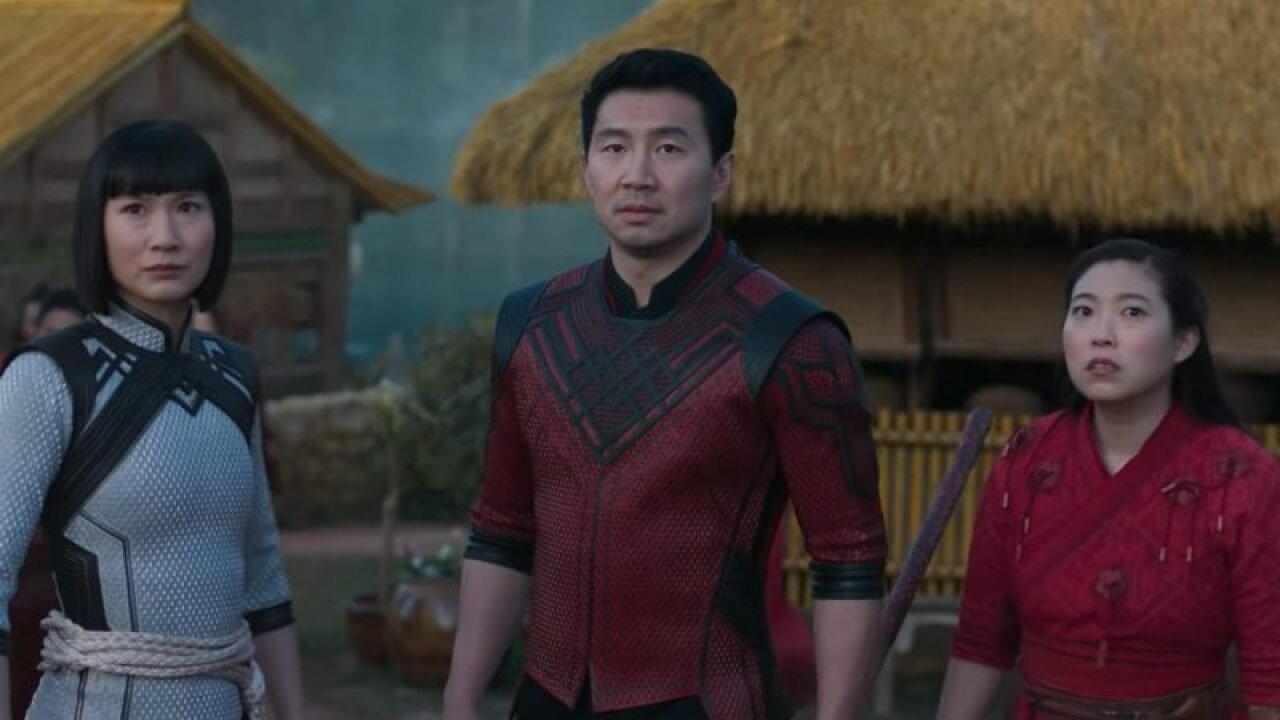SHANG-CHI AND THE LEGEND OF THE TEN RINGS
Directing: B+
Acting: B
Writing: B+
Cinematography: B+
Editing: B+
Special Effects: B
I spent several years actively avoiding superhero movies, which sometimes feel actively designed by Marvel Studios to be a punishment of sorts should you try to venture back into their “cinematic universe” without having seen everything. The thing is “everything” is a lot—and increasingly so as time goes on: Shang-Chi and the Legend of the Ten Rings marks the twenty-fifth MCU film since this universe they all share was created in 2008. It’s pretty tempting to say that’s just too many. Who has time for this shit?
Well, to be fair, these movies work a lot better when thy barely acknowledge the events of the other films, if at all. Thankfully, this is done sparingly in Shang-Chi; a single passing reference to Thanos snapping half the universe out of existence is easily missed if you’re not paying attention. On the other hand, it depends on how you look at it: Ben Kingsley returns for a supporting role here as Trevor Slattery, who was originally seen in 2013’s Iron Man 3, one of the least memorable of the MCU films. Do we need to go back and re-watch old MCU movies to “bone up” now? I would argue no: Kingsley’s part is delightful on its own terms here, even if you can’t quite remember where Slattery originated.
Shang-Chi has a lot of other stuff going for it, anyway. That’s the point I’m getting at, really: my disillusionment with superhero movies seems to be healing a bit, not because the genre is inherently great, but because filmmakers are finding ways to make them better. Instead of movie after movie just adhering to the same tired story arcs, writers and directors are expanding on them. And in the current “phase,” diversity is justifying itself by example. It’s not just one white guy after another anymore—we’re spreading across continents: Black Panther took us to Africa; Shang-Chi takes us to Asia (specifically China). All we need now is a Marvel movie about a Latino superhero with deep familial roots somewhere in South America. Or better yet, an Indigenous superhero.
Of course, much like Black Panther to Black audiences, what Shang-Chi is likely to represent to Asian audiences should probably not be underestimated. Until now, the only high-profile mainstream film in which all of the leads were Asian was Crazy Rich Asians (which, incidentally, came out the same year as Black Panther). A lot of unfair representative responsibility and criticism was heaped on that film, for that very reason. Well, guess what? Now we have Shang-Chi and the Legend of the Ten Rings, and it being of a completely different genre notwithstanding, it is an objectively better film.
Okay, sure, Shang-Chi does still get a little bogged down in its climactic battle sequence, far too busy and far too reliant on barely visually comprehensible CGI. (Once again, I find myself noticing flaws in the computer animation, certain that these visuals will look dated within the decade. There remains something to be said for practical effects, or at least practical effects well integrated with CGI touchups.) This movie also literally moves into another dimension, featuring an action sequence on the streets of San Francisco early on, only to later move to Macao and then to another dimension and then never returning. We find ourselves in a world with magical creatures, bat-like demon creatures, and dragons. It lends an air of the traditional fantasy genre, almost more so than the superhero genre. I suppose it’s a kind of mythology either way.
And I am at a disadvantage here, being so little versed in Chinese mythology and folklore. To what degree are the magical creatures we see here authentic to those sources? Black Panther had been famous for its authentically African-influenced design; one would hope Shang-Chi would have similarly authentically Asian influences. A giant dragon that appears in the third act, as well as some truly fantastic and adorably rendered giant Chinese lions, all look very much like what you would typically see in Chinese New Year celebrations. The giant demon soul-sucker, though … that one, I have no idea.
As you might imagine, Shang-Chi features several martial-arts-heavy battle sequences, which bear a passing resemblance to the battles from Crouching Tiger, Hidden Dragon and other films of its ilk. This is clearly not an accident, and these scenes are very well choreographed. In fact, they are consistently very exciting, much more so than, for instance, a runaway bus on the hills of San Francisco. And because the title character (played with just the right amount of charisma by Simu Liu) and his sister Xu Xialing (Meng'er Zhang) are the children of both a power-hungry man who has used the magical Ten Rings to live over a thousand years, and a woman from a village in another dimension accessed via a magical forest, their physics-defying movements don’t especially pose a problem.
The story details here are indeed fairly complex, and its team of script writers does an unusually skilled job of weaving them into the plot in a fairly organic way, not to mention presenting an origin story without it feeling like one. We even get Awkwafina as Katy, Shang-Chi’s longtime friend and comic sidekick. In retrospect she doesn’t ever prove to be vital to the story at all, but her presence is always fun. At least this time, as opposed to Raya and the Last Dragon, she is well cast and has good chemistry with her cast mates.
In any event, Shang-Chi and the Legend of the Ten Rings is great fun from start to finish, in a way that actually makes me look forward to seeing more movies like it. After I spent several years actively resenting superhero films, that’s saying a lot.
It’s not as confused as they look!
Overall: B+

